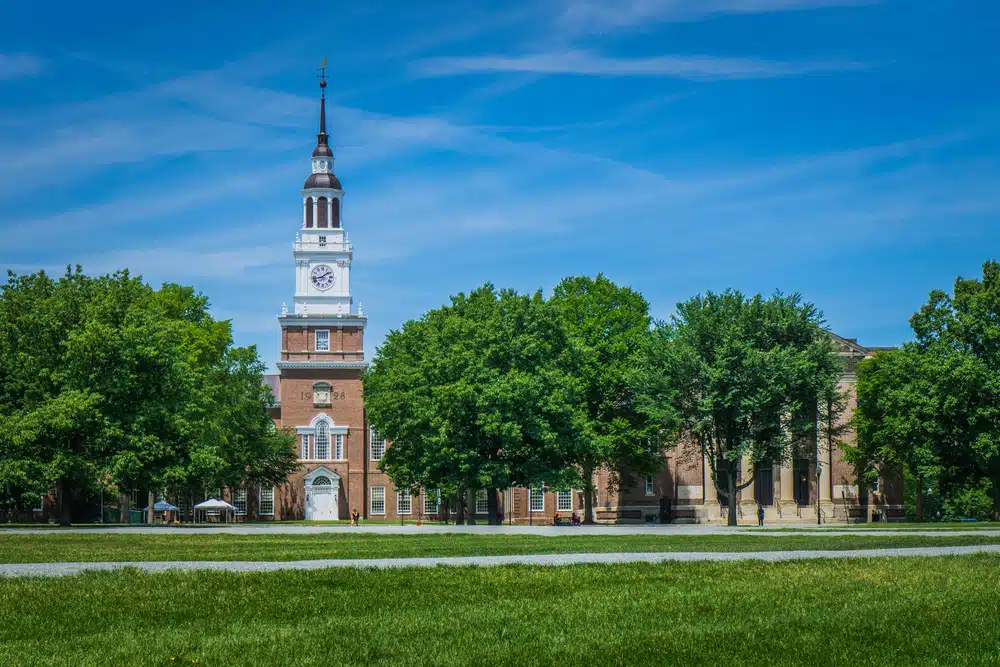Founded in 1769, Dartmouth is one of the oldest institutes of higher learning in the country. Furthermore, it’s been recognized as one of the leading universities ever since its founding over two centuries ago.
Despite being the smallest member of the highly esteemed Ivy League, Dartmouth has maintained a reputation as being one of the most selective and sought-after of the Ivies. This competitiveness leads many applicants to search for “how I got into Dartmouth” success stories to hear from people who had succeeded at the very feat they’re attempting.

Dartmouth’s smaller size comes with a variety of advantages. First and foremost, the faculty-to-student ratio is better than most Ivy League schools, making for more intimate and personalized classes.
Furthermore, the community itself is very tight-knit. There’s a strong sense of camaraderie and inclusivity. Despite having a relatively small undergraduate class, Dartmouth’s students still come from all across the country and the world, making for a culture that’s rich in diverse thoughts and experiences.
Here, we’ll take a look at some “how I got into Dartmouth” success stories to give eager applicants some insight and inspiration from current or previous Dartmouth students. We’ll also explore how hard is it to get into Dartmouth.
How hard is it to get into Dartmouth?
One of the first questions applicants have about a college is how difficult it is to get into. A university’s acceptance rate is commonly accepted as the basic metric for determining how challenging the school’s admissions process is. For the Class of 2024, 21,392 students applied to Dartmouth.
Of these tens of thousands of students, only 1,973 were accepted. This puts Darmtouh’s admission rate at 9.2%. To put this into perspective, for every 100 people that apply to the university, only 9 end up getting accepted. It’s often difficult to gauge these acceptance rates without any context.

When compared to all colleges in the United States, Dartmouth is highly selective. In fact, the average admission rate for universities across the country is 68%. That means Dartmouth is over seven times more selective. However, it’s important to consider this university’s prestige and value.
When compared to the other seven universities in the Ivy League, Dartmouth is actually less competitive. Although it varies from year to year, Cornell is typically the only Ivy League school that’s easier to get into than Dartmouth.
All other Ivies are more demanding in their admissions process. When placed in this context, students often feel better about Dartmouth’s acceptance rate given its world-class academic offerings.
What kind of students make it into Dartmouth?
Admission rates are an excellent metric for determining how difficult it is to get into any given university. However, it’s important to remember that this percentage isn’t necessarily reflective of your chances of getting into college.
For example, just because Dartmouth’s acceptance rate is 9.2% doesn’t mean you have a 9.2% chance of getting admitted. While it’s not possible to calculate your exact chances, there are some objective metrics you can look at. Class performance, GPAs, and standardized test scores are some important factors admissions officers at Dartmouth look at when determining who gets accepted and who doesn’t.

It’s imperative to remember that Dartmouth takes a holistic approach to its admissions process, meaning that a variety of academic and non-academic factors are taken into consideration. However, test scores and grades are some of the more objective metrics that are comparable between students.
Seeing how you stack up against accepted applicants is a great way to get a better understanding of your chances of getting into Dartmouth. For the Class of 2024, the mid 50% range for the SAT Critical Reading section was 710 to 770. This range was 730 to 790 for. the SAT Math portion. For the ACT, accepted students had a mid 50% range of 32 to 35.
Does applying during early decision make a difference?
Unfortunately, most applicants are unaware that universities offer two separate timelines for applications: the standard and the early action or early decision timeline.
Dartmouth is no exception to the rule, giving students a choice between the two application periods. At first glance, there doesn’t seem to be an advantage to applying early other than maybe getting all of the stress and anxiety out of the way.
However, when you look at the numbers, there’s actually a real incentive to apply during this early decision timeline. Namely, the acceptance rate is significantly higher than for the standard application period. By how much?

2,069 students applied for the Dartmouth Class of 2024 during the early decision. Of these thousands of applicants, a total of 526 students were accepted. That makes the early decision acceptance rate 26.4%.
That’s nearly three times higher than the admission rate for the standard application timeline. So, why would anyone choose to apply during the normal application period when the application rate is so much lower? Well, the early decision admission is binding at Dartmouth. This means that accepted students are committed to attending the university.
For this reason, only people who are 100% certain that Dartmouth would be their first choice are advised to apply during early decision. If you’re still on the fence about the university or have another college that’s still sitting at your number-one spot, we would advise you to apply during the standard timeline.
3 success stories students accepted to Dartmouth
When you’re at the beginning of the admissions process, it can feel like you’re standing at the bottom of a massive mountain. As you look up, you have mixed feelings of excitement, confusion, uncertainty, and anxiety.
Just like you do when you’re tackling a mountain, talking to someone who has succeeded in climbing the admissions process is a great way to gain some inspiration, insight, and motivation.
Fortunately, there are many successful Dartmouth applicants who have shared their stories online. While these individuals aren’t experts, they were once in your exact position and were able to accomplish what you’re stirring for. Here, we’ll take a look at three Dartmouth success stories to provide you with some insider tips and information.
Success Story #1
“Like all top schools, Dartmouth’s acceptance rate is shrinking year by year. For a college like Dartmouth, you’ll need to have it all. A top-notch academic track record, impressive resume, compelling personal statement, and strong Dartmouth essays are all necessary to show that they want you. While you need to be the total package, there are a few things you should keep in mind if you hope to get into Dartmouth:
Be “well-rounded”
Most schools seek angular candidates in particular. Rather than be involved in a variety of extracurriculars, admissions officers often look for students that have gone after one passion and made it really impressive. While Dartmouth appreciates these dilettantes, they are known to go after more “well-rounded” applicants. They welcome applicants with commonplace interests, like sports and outdoors activities. When applying to Dartmouth, don’t be afraid to show all sides of you.
Be cool
A Former Admissions Reader from Dartmouth relayed to me that Dartmouth is a sucker for the “cool factor.” Think about everyone around you. If you’ve achieved something or pursed an interest that the average high schooler has not, then a Dartmouth Admissions Officer is likely to stop and say “wow—that’s pretty cool.” Whether it’s starting a non-profit or being a champion unicycler, think about ways you can differentiate yourself.
An interest in the humanities
Dartmouth has historically been a humanities-centric school. Because it’s a college, it lacks large, scientific facilities that many universities possess. Therefore, the humanities have been where Dartmouth tends to thrive. From an Admissions Officer’s perspective, if you list that you’re interested in a science, they’ll be a bit worried that you’ll ultimately decide to attend another university with stronger programs in these fields. Because of this reality, Dartmouth has been and will most likely continue to prefer students who indicate that they’re interested in the humanities.”
- Joel Butterly, former student at Dartmouth College
Success Story #2
“Pretty simple, really. I’ve actually seen some of my admissions documents and I’ve spoken with my admissions counselor, and I think I have a good idea about why I was accepted.
I’m from a rural-ish area in Utah and went to low-income-ish public schools, and they wanted to add to the diversity of the student body – most students come from cities on the coasts.
I had very good scores on AP Exams and the ACT.
I’m a good writer, and told my story well on my essays.
I don’t really care about resume-building or optimizing my application, and I think that came across. It was clear from all the many flaws in my application that I didn’t have a tutor, and I didn’t get lots of advising help in getting into Dartmouth. Advisors can see this, and it changes the way they evaluate a candidate.
I have a bit of an unconventional major – I want to study imagination using cognitive science, computer science, literature, art, and philosophy – and I think that appealed to them.
I also was certain that I wanted to go to Dartmouth, and I didn’t apply to any of the other Ivies or really any other elite schools. I just applied to Dartmouth, and then a whole horde of other liberal arts schools that had free and low-effort applications (just in case).”
- Jeremy Hadfield, B.S. Cognitive Science & Philosophy, Dartmouth College (2021)
Success Story #3
“Dartmouth admissions are broken down in three main categories: Athlete, legacy, everyone else.If you’re a recruited athlete, you don’t even need to ask this question.
If you’re a legacy, meaning other members of your family have attended Dartmouth, then you’re already a good portion of the way to admission. If you’re everyone else, then here are the things that are important for you in admissions:
- Good grades
- It’s okay if you have a B or two on your transcript, but make sure you’re showing upwards trends in performance. Your B’s should ideally be in the first or second year of high school; A B in your senior is less forgiving
- Phenomenal essays
- During my senior year, I did Dartmouth Bound. During this program, we had talks with admission officers on how to craft good admissions essays. I remember being told that the story of your college essay is what matters, not so much the quality of writing.
- Purpose and leadership in your extracurricular activities
- If it seems like you’re partaking in your ECs just to get into Dartmouth, the admissions officers will likely see through that. How do you avoid this?
- Do not wait until your junior year to join clubs and start playing a sport. Longevity and commitment is important.
- Have trends in your ECs. I am passionate about education and service, and I applied as a math major. My ECs surrounded service work, education-related things, and STEM clubs.
- Interview well
- Come prepared for your interview. Have questions about the school for your interview. I googled my interviewer to see their age and then asked questions based off of that.
- I had most of my interviews at a coffee shop, which made me confused about social etiquette. To avoid awkward “let me buy you a coffee” on both ends, I always arrived early and bought myself a coffee before they arrived. This way neither party has to offer to buy the other coffee! So much less awkward.
- Share your hardships
- I applied to college despite being a low-income, first generation college student and going through foster care, adoption, and related adversities in high school. This meant that high school was more difficult for me than it was for John Doe, who had his parents to pay for SAT prep classes, never had to worry about family finances, had parents to help him navigate applications, etc.. If you have faced hardship like such, don’t be afraid to talk about them. They are unique and show your dedication, capability, and brilliance to the office that reads your application.
Dartmouth does not look for personality traits per se. Dartmouth is very outdoorsy and rural, which often makes prospective students think they too have to adore hiking and climbing to get into Dartmouth. That’s not true. Just be yourself and be a good student; you’ll have a fine shot.”
- Rachel Muir, B.A Government & Education, Dartmouth College (2020)
Write your own “How I got into Dartmouth” story
When reading these “How I got into Dartmouth” stories, you might be wondering what it’s like on the other end – writing one of those success stories as a Dartmouth student. It might seem far away, but it’s very possible! How do we know?

As a leading college entrance expert, AdmissionSight has helped countless students overcome the challenges of Ivy League admissions processes to earn a spot in the universities of their dreams. In fact, 75% of our students either get accepted to an Ivy League school or a Top 10 University.
With over a decade of experience, we’ve mastered the college admissions process and know what it takes to get into each school. Our services are specifically designed to help students improve their application and catch the attention of admissions officers. Here are some of the services we offer:
- Extracurricular Planning – Ivy League admissions officers don’t just care what you’re in the classroom. We can help you choose extracurriculars that pique your interest, fit into your field of study, and catch the attention of world-class colleges.
- Summer Program Selection – There are some great summer programs designed to help students further their academic pursuits while developing their skills in real-life contexts. We’ll support you in finding the best program given your field of study, interests, and school of choice.
- Interview Preparation – Many universities have an interview section of the admissions process where students meet with a representative. We’ll show you how to nail this interaction so you can make a positive impression, get your questions answered, and come away with better chances of getting accepted.
- Pre-High School Planning – For parents who want to get a headstart on their child’s educational preparation, we can make recommendations when choosing a high school curriculum. By the time college admissions rolls around, your student will be in the best position to succeed.
All of our services are completely personalized to meet the personal strengths, academic interests, and professional goals of our students. If you’re interested in using one of our services or learning more about us, feel free to contact AdmissionSight for a free consultation. We look forward to hearing from you.





































